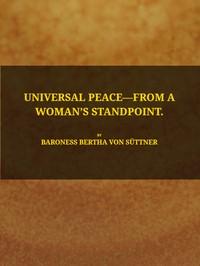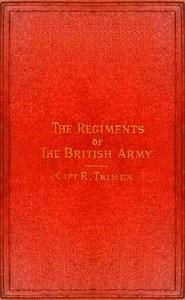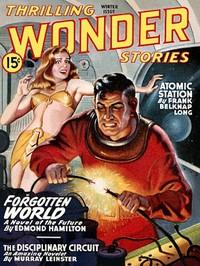|
|
Read this ebook for free! No credit card needed, absolutely nothing to pay.Words: 111499 in 19 pages
This is an ebook sharing website. You can read the uploaded ebooks for free here. No credit cards needed, nothing to pay. If you want to own a digital copy of the ebook, or want to read offline with your favorite ebook-reader, then you can choose to buy and download the ebook.

: Universal peace—from a woman's standpoint by Suttner Bertha Von - Peace; Pacifism; Peace movements@FreeBooksThu 08 Jun, 2023 UNIVERSAL PEACE--FROM A WOMAN'S STANDPOINT. BY BARONESS BERTHA VON S?TTNER. I have been requested to write a contribution to these pages with the above title. The subject of Universal Peace occupies my thoughts and actions so completely, and the opportunity of addressing myself to a circle of American readers is so welcome to me, that I was most willing to comply with the wish of the Editor, although I should certainly have chosen another title. For although it is self-evident that everything that a woman writes must be written from a woman's standpoint, it does not agree with my principles to treat the problem of peace and war exclusively, or even principally, in its relations to the feelings and lives of women. Such relations certainly exist, and it will be of great service to the progress of the peace movement if women, as such, will oppose the institution hateful to mothers, and if women's associations will place the questions of peace and arbitration on the order of the day at their meetings. But I believe that more and more women, who reflect upon this important subject, will leave the specifically feminine standpoint, to judge of this, so eminently the universal concern of humanity, from a more general point of view. It is only too natural that women should hate war, which robs them of the support and the joys of their existence, and for that very reason until to-day this hatred has done nothing towards the struggle against war; on the contrary, only such women as could triumph over their natural feelings of abhorrence, who, putting aside their own grief, could incite to war, or even themselves perform warlike deeds, only such women were brought into prominence by history; only these were praised, because, overcoming their egoism, they had performed their duty by performing brave deeds of sacrifice. One may presuppose that among the many motives which in the future will work against militarism and war, the following powerful motive will be found: the change in women's favor. When once a higher reward of love is granted to men for the heroic deeds of peace than for those of war, when they know that they will only earn the admiration of the best women by working for the new ideals of justice; and, on the contrary, will arouse the abhorrence of noble women by supporting the system of force, then one of the strongest motives which now drive young men into the profession of arms will be overcome. The true and most important connection between the woman's question and the peace question is this: the realization of the ideals of peace presupposes that the whole of humanity should rise to a higher level than that upon which it now stands in an overwhelming majority. In order that the element of force and oppression, which governs the history of society in the past and in the present, should yield to the element of right and freedom, a higher type of man must be evolved. We are now witnessing this evolution. It is, however, not apparent only in one sphere, but in many at the same time, and especially strongly in the sphere of the women's movement. To the attainment of the ideal towards which modern endeavors are moving, the unimpeded development is necessary of all mental germs in the whole human race. None of the gifts shared by all may be suppressed by reason of supposed unsuitability to the race, or class, or even sex; and the virtues, the larger diffusion of which is to characterize the new type, must be no longer divided into two halves; gentleness and moderation on the feminine, courage and intellectual power on the masculine, side. No; every person will have to exhibit these virtues, no matter to which sex one may belong. Just as at the present day there are many common qualities, without which neither woman nor man can lay claim to esteem, such as honesty, cleanliness, diligence, love of truth, sense of duty, in the same manner does the new ideal of perfection exact all human virtues from all human beings at the same time. With the removal of other privileges those of crime must also cease, and man shall no longer pride himself on his excesses. Courage, that model virtue, first of the lion, then of the savage, then of the hero, lastly of the soldier always ready for battle, must lose its halo, and must not be practised only by men to the point of contempt of life, but will be required in hours of danger, in life's difficult situations in a like measure from the perfectly human woman. The human race will not be left alone to the care of woman, but every perfect human being must disdain to be a slave to the pleasure of the senses without love or in treacherous disloyalty. Thus it will happen by the falling of the fetters which one sex has borne so long, that not it alone, but also the other will rise to a higher human dignity. Exactly the contrary will take place of what is dreaded by the opponents of the emancipation of women: the woman will not assume gross masculine defects, the man will not sink into womanish effeminacy, but both united, among them the best, the strongest, and the most intelligent, will form models of a nobler race. It is unimaginable that a more highly developed cultured humanity, in which both sexes have equal rights in the decisions of society, should uphold the institutions of war. A certain amount of compassion, of sensitive abhorrence of all that is hard and cruel, in a word--of noble humanity, must exist in the cultured community. Men console themselves with the thought that these qualities, so necessary to the existence and dignity of society, are furnished by the feminine sex, and maintain their right to hardness and roughness, a right which is most freely active in war. But when the woman rises to an equal level, must she also become a soldier, and shall she lay aside those virtues which are not compatible with the profession of arms? Shall all gentleness vanish out of the world? That is impossible. Therefore the woman must renounce equal rights. This she will never do; it is much simpler for the man to renounce the profession of arms. And now, after protesting against my views being supposed to arise from a specifically feminine standpoint, I will say what I think about universal peace; but first, I should like to give a picture of universal war, as I see it from the war of the future, so long prophesied and so splendidly prepared. Footnote 1: A war in which all the great military States of Europe took part would surpass all horrors that have hitherto taken place, in the same degree as the present weapons of destruction and those still to be invented surpass the club with which Cain may have slain his brother. In such a war an amount of murder and destruction and savagery would be contained, such as was not in a hundred battles of ancient times. The progress that has been made has not only increased the power of destruction a thousandfold, but also that which is to be destroyed has become a thousand times more valuable, and therefore the injury would be proportionately greater. But to contemplate peace and war from a general standpoint is what philosophers and politicians have done from the earliest times. To work out plans and propositions, by which the ruling state of war may be replaced by the establishment of international justice, is a labor which has been carried on systematically for the last ten years by the various groups of the League of Peace, and the inter-parliamentary union. An entire literature already exists on this subject, and by consulting Dr. Evan Darby's "International Tribunal" and Dr. Benjamin Trueblood's lately published work, "The Federation of the World," a complete knowledge of the ideal and practical aims may be gained, as also of the results already acquired. Footnote 2: London Peace Society, 47 New Broad Street. Free books android app tbrJar TBR JAR Read Free books online gutenberg More posts by @FreeBooks
: Perch of the Devil by Atherton Gertrude Franklin Horn - Social classes Fiction; Spouses Fiction; Butte (Mont.) Fiction@FreeBooksThu 08 Jun, 2023

: The Wellfields: A novel. Vol. 1 of 3 by Fothergill Jessie - English fiction 19th century@FreeBooksThu 08 Jun, 2023
|
Terms of Use Stock Market News! © gutenberg.org.in2025 All Rights reserved.






